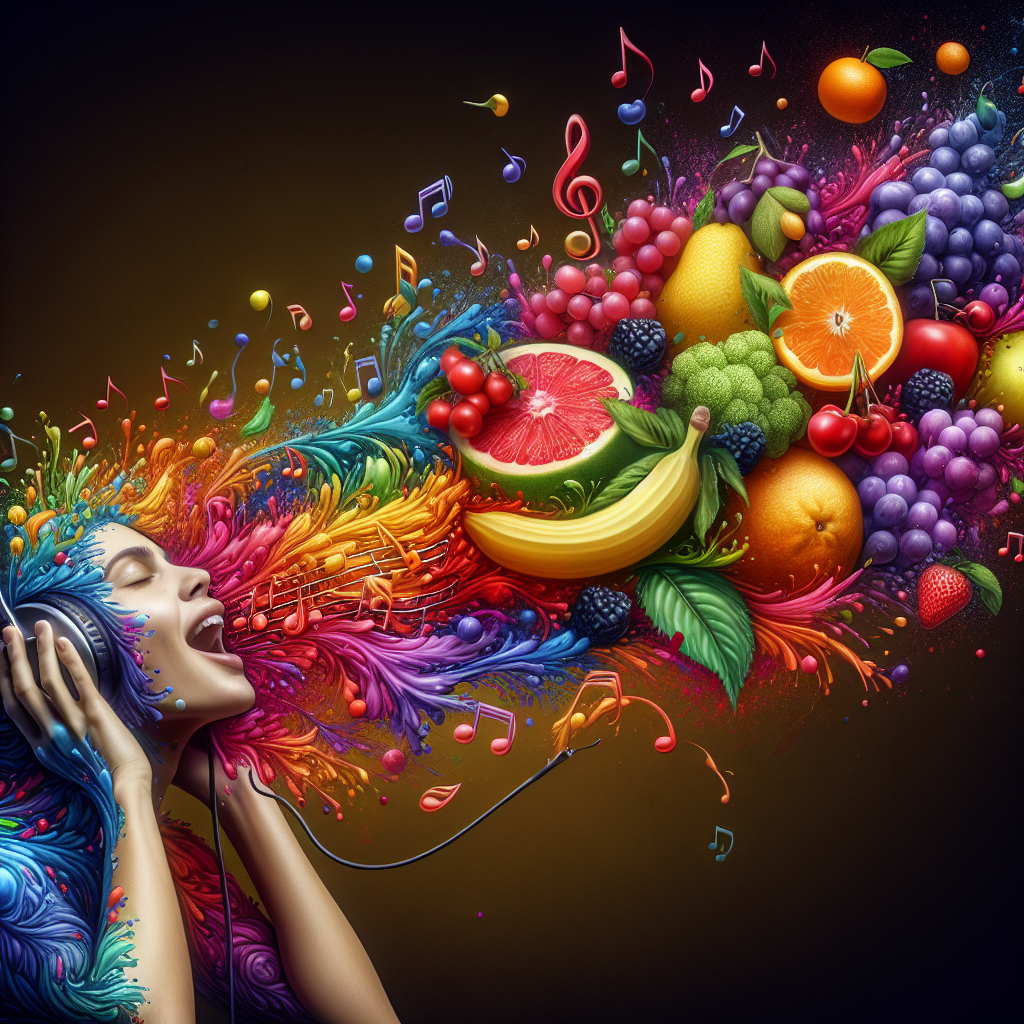How Vitamins Enhance Mood and Music Enjoyment

Discover how vitamins can enhance your mood and music enjoyment! Learn more about the powerful impact of proper nutrition on your emotional well-being and sensory experiences. Don’t wait, start your journey to a happier, more vibrant life today. Click here to find out more.
Exploring the Connection Between Vitamins, Mood Enhancement, and Music Enjoyment
The intricate relationship between vitamins, mood enhancement, and music enjoyment is a fascinating area of study that has been gaining traction in recent years. This connection, though seemingly unusual, is rooted in the fundamental understanding of how our bodies and minds function. Vitamins, essential nutrients that our bodies need for proper functioning, play a significant role in maintaining our mental health. They are known to influence our mood, and by extension, our capacity to enjoy music.
The human body requires a variety of vitamins to function optimally. These vitamins, which include vitamins A, B, C, D, E, and K, among others, are involved in numerous physiological processes. They aid in energy production, immune function, blood clotting, and maintaining the health of our skin, eyes, and brain. In the context of mood enhancement, certain vitamins have been found to be particularly influential.
Vitamin B, for instance, is known to play a crucial role in brain function. It aids in the production of neurotransmitters, which are chemicals that transmit signals in the brain. These neurotransmitters are responsible for regulating mood. A deficiency in Vitamin B can lead to mood disorders such as depression and anxiety. On the other hand, maintaining adequate levels of this vitamin can help enhance mood, leading to a more positive outlook on life.
Similarly, Vitamin D, often referred to as the ‘sunshine vitamin’, has been linked to mood regulation. It is produced in the skin in response to sunlight and can also be obtained from certain foods. Research has shown that low levels of Vitamin D are associated with mood disorders, including depression. Conversely, adequate levels of Vitamin D have been associated with improved mood and a general sense of well-being.
Now, how does this relate to music enjoyment? Music, like vitamins, has a profound effect on our mood. It has the power to evoke a wide range of emotions, from joy and happiness to sadness and melancholy. The enjoyment of music is a deeply personal experience that is influenced by our current mood. When we are in a positive mood, we are more likely to enjoy music and derive pleasure from it. Conversely, when we are in a negative mood, our enjoyment of music may be diminished.
Therefore, by enhancing our mood, vitamins indirectly influence our enjoyment of music. When we maintain adequate levels of mood-enhancing vitamins such as Vitamin B and Vitamin D, we are more likely to be in a positive mood. This, in turn, increases our capacity to enjoy music. It allows us to fully immerse ourselves in the music and derive maximum pleasure from it.
In conclusion, the connection between vitamins, mood enhancement, and music enjoyment is a testament to the complex interplay between our physical health and mental well-being. By ensuring that we maintain adequate levels of essential vitamins, we can enhance our mood and, by extension, our enjoyment of music. This underscores the importance of a balanced diet rich in essential vitamins for our overall well-being. So, the next time you listen to your favorite song, remember that your enjoyment of it may be enhanced by the vitamins you consumed earlier in the day.
The Role of Vitamins in Boosting Mood and Enhancing Music Experience

Vitamins play a crucial role in maintaining our overall health, but their impact extends beyond just physical well-being. Recent studies have shown that certain vitamins can significantly enhance mood and even amplify our enjoyment of music. This fascinating intersection of nutrition, psychology, and musicology offers a fresh perspective on how we can optimize our daily lives.
To begin with, let’s delve into the role of vitamins in mood regulation. The human brain is a complex organ that relies on a delicate balance of chemicals and processes to function optimally. Vitamins, particularly B-complex vitamins and vitamin D, have been found to play a significant role in maintaining this balance. For instance, vitamins B6, B9, and B12 are essential for the production of serotonin, a neurotransmitter that regulates mood, sleep, and appetite. A deficiency in these vitamins can lead to decreased serotonin production, which is linked to mood disorders such as depression and anxiety.
Similarly, vitamin D, often referred to as the “sunshine vitamin,” has a profound impact on mood. It is produced in the skin in response to sunlight and can also be obtained from certain foods. Vitamin D receptors are found throughout the brain, including in areas linked to the onset of depression. Research has shown that vitamin D deficiency is associated with an increased risk for mood disorders. Therefore, maintaining adequate levels of these vitamins is crucial for mental health.
Transitioning from the realm of mood to music, it’s intriguing to note that our enjoyment of music is also influenced by our nutritional status. Music, like mood, is processed in the brain, and the same nutrients that support mood regulation also enhance our music experience. For example, the B-complex vitamins, which aid in the production of serotonin, also play a role in our perception of music. Serotonin is known to influence our emotional response to music, and a well-nourished brain can process music more effectively, leading to increased enjoyment.
Moreover, music itself can stimulate the release of certain chemicals in the brain that are associated with pleasure and reward. When combined with a balanced diet rich in mood-enhancing vitamins, the result can be a significantly heightened music experience. This synergy between nutrition and music is a testament to the interconnectedness of our bodily systems and the multifaceted role of vitamins in our lives.
In conclusion, the role of vitamins in boosting mood and enhancing the music experience is a burgeoning field of study that holds much promise. By understanding the intricate relationship between nutrition, mood, and music, we can make informed dietary choices that not only support our physical health but also enrich our emotional well-being and cultural experiences. So, the next time you reach for your favorite album or playlist, remember that a well-nourished body can enhance your listening experience. And who knows? With the right balance of vitamins, your favorite songs might just sound a little bit sweeter.
Unveiling the Impact of Vitamins on Emotional Well-being and Music Appreciation
The intricate relationship between our physical health and emotional well-being is a fascinating area of study. One aspect that has garnered significant attention is the impact of vitamins on our mood and, interestingly, our enjoyment of music. This article aims to unveil the profound influence of vitamins on emotional well-being and music appreciation.
Vitamins, essential nutrients that our bodies need for proper functioning, play a crucial role in maintaining our mental health. They are involved in the production of neurotransmitters, the brain chemicals that transmit signals between nerve cells and influence our mood. For instance, Vitamin B6 aids in the production of serotonin, a neurotransmitter that contributes to feelings of happiness and well-being. A deficiency in this vitamin can lead to depression, irritability, and other mood disorders. Similarly, Vitamin D, often referred to as the ‘sunshine vitamin’, is known to have mood-enhancing properties. Research has shown that low levels of Vitamin D are associated with mood disorders, including depression and seasonal affective disorder.
The role of vitamins in emotional well-being extends to our enjoyment of music, an experience that is deeply intertwined with our emotions. Music has the power to evoke a wide range of emotions, from joy and excitement to sadness and nostalgia. The ability to fully appreciate and enjoy music, therefore, can be significantly influenced by our emotional state, which, as we have seen, is closely linked to our vitamin intake.
Vitamin B12, for example, is essential for maintaining nerve health and cognitive function. A deficiency in this vitamin can lead to neurological problems, including memory loss and confusion, which can hinder our ability to process and enjoy music. On the other hand, adequate levels of Vitamin B12 can enhance our cognitive abilities, allowing us to better appreciate the complexities and nuances of music.
Moreover, vitamins can also influence our physical response to music. Music often triggers a physical reaction, such as tapping our feet or dancing, which is a reflection of our emotional response to the music. Vitamins, particularly the B-complex vitamins, play a key role in energy production and muscle function. Adequate levels of these vitamins can enhance our physical response to music, thereby increasing our overall enjoyment of the music.
In conclusion, vitamins play a pivotal role in our emotional well-being and our enjoyment of music. They are involved in the production of mood-regulating neurotransmitters and contribute to cognitive function and physical health, all of which can influence our music appreciation. Therefore, maintaining a balanced diet rich in vitamins is not only essential for our physical health but also for our emotional well-being and enjoyment of life’s simple pleasures, such as music.
However, it’s important to note that while vitamins can contribute to mood enhancement and music enjoyment, they are not a cure-all solution. Mental health is a complex issue that can be influenced by a variety of factors, including genetics, environment, and lifestyle. Therefore, if you’re struggling with mood disorders or other mental health issues, it’s crucial to seek professional help. Vitamins can be a part of a comprehensive approach to mental health, but they should not replace professional treatment.